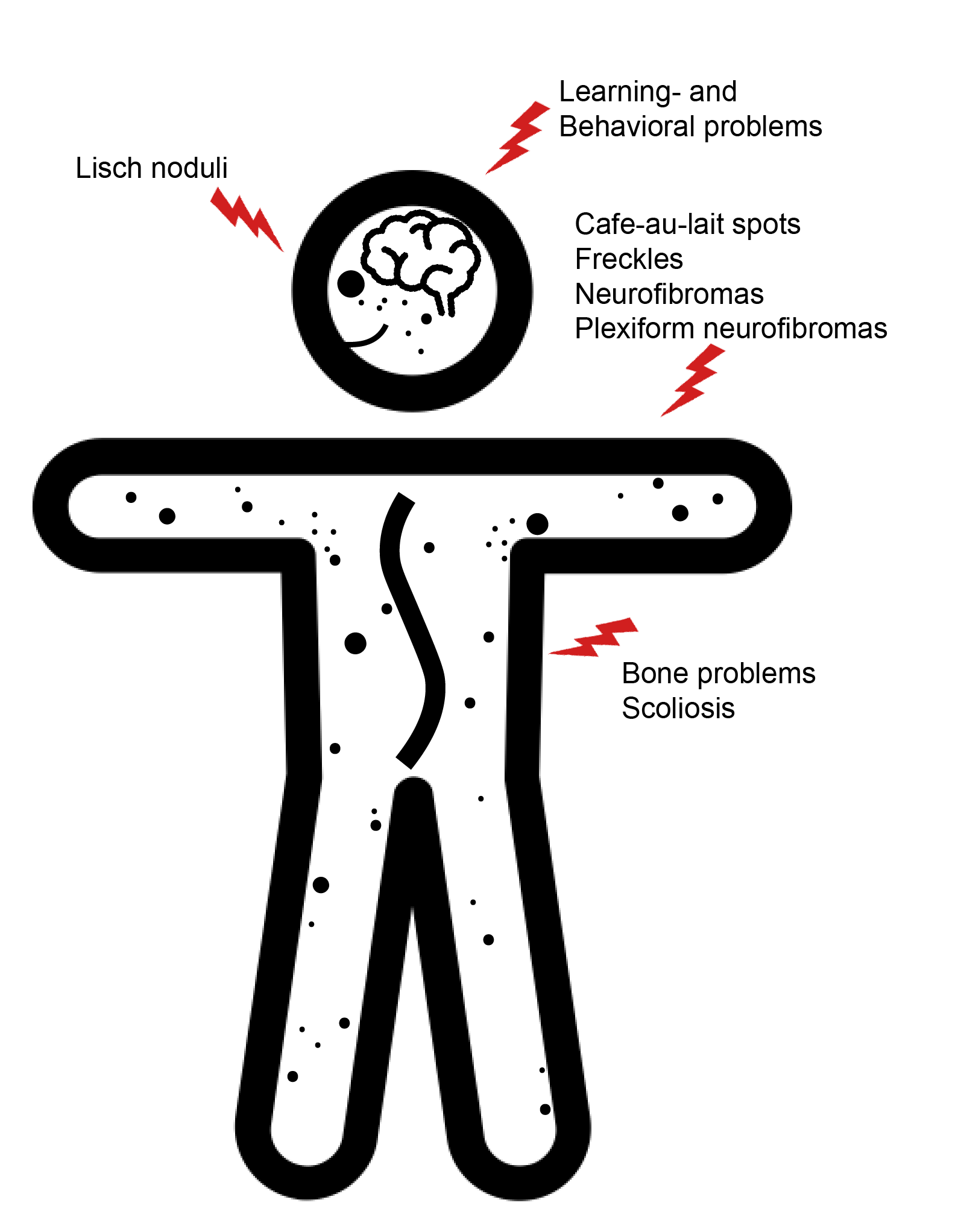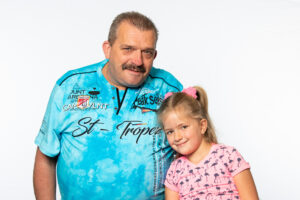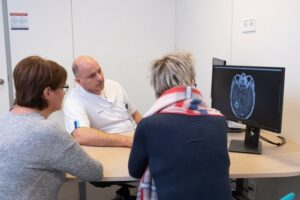What is Neurofibromatosis type 1?
 Neurofibromatosis type 1 (NF1) is a rare genetic disease characterized by skin disorders (cafe au lait maculae) and neurological symptoms. The disease causes tumors in the nerves. These are generally benign, but can progress to malignant tumors. Another name for this type of tumor is neurofibroma. Nerves in the skin, as well as in other organs, can have such tumors. For example, NF1 can also influence the exchange of signals in the brain, causing various social-emotional and learning problems. You usually get the first visible signs when you are a few years old, because at this age you can see the visible signs of NF1. NF1 can express itself in many different ways. Some people just have a few spots on the skin. In others, NF1 is a serious, complicated condition. NF1 cannot be cured, but the complaints caused by NF1 can often be treated.
Neurofibromatosis type 1 (NF1) is a rare genetic disease characterized by skin disorders (cafe au lait maculae) and neurological symptoms. The disease causes tumors in the nerves. These are generally benign, but can progress to malignant tumors. Another name for this type of tumor is neurofibroma. Nerves in the skin, as well as in other organs, can have such tumors. For example, NF1 can also influence the exchange of signals in the brain, causing various social-emotional and learning problems. You usually get the first visible signs when you are a few years old, because at this age you can see the visible signs of NF1. NF1 can express itself in many different ways. Some people just have a few spots on the skin. In others, NF1 is a serious, complicated condition. NF1 cannot be cured, but the complaints caused by NF1 can often be treated.
What Causes Neurofibromatosis Type 1?
NF1 is a genetic condition. The condition develops when the NF1 protein (neurofibromin) that the body makes is absent or not working properly. The “recipe” for the production of the NF1 protein is stored in our genetic material, the DNA. The DNA contains the genetic code for our hereditary characteristics, the genes. The DNA is packed in chromosomes. In NF1, the error is in the NF1 gene on chromosome 17. The genetic defect usually occurs at the time of fertilization. There is then a small risk of recurrence. It could also be that one of the parents has the condition. Then there is a 50% recurrence chance. It is therefore important to have this investigated.
How common is Neurofibromatosis type 1?
About 1 in every 2500 babies born has NF1. In the Netherlands approximately 4,000-6,000 people live with NF1. It is as common in boys / men as in girls / women.
NF1 clinic for children
A few weeks before the consultation hour you will receive a questionnaire for you and / or your child by email. These are questions that help us to know in advance how your child is doing, and which problems should be discussed during the consultation hour.
At the consultation hour, your child will first be measured and weighed by the assistant and the blood pressure will be measured. Your child will then be examined by the various doctors. Because we function as a team, you will not see the same doctors every visit. At the ophthalmologist your child will sometimes get drops in the eyes to temporarily widen the pupil.
 In principle, you or your child will be called up for the medical check-ups and these will take place in one half day. During this consultation hour a clinical geneticist is usually present, who can contact you or your child (even without an appointment) with questions about heredity. If necessary, your child will be seen more often outside of these regular check-ups by one of the specialists involved (pediatrician, pediatric neurologist, psychologist or ophthalmologist). For example, a check-up with another specialist can also take place, such as the orthopedist, dermatologist, (neuro or plastic) surgeon, oncologist or examination by a child psychiatrist or speech therapist. If necessary, X-rays or scans or blood tests are also taken.
In principle, you or your child will be called up for the medical check-ups and these will take place in one half day. During this consultation hour a clinical geneticist is usually present, who can contact you or your child (even without an appointment) with questions about heredity. If necessary, your child will be seen more often outside of these regular check-ups by one of the specialists involved (pediatrician, pediatric neurologist, psychologist or ophthalmologist). For example, a check-up with another specialist can also take place, such as the orthopedist, dermatologist, (neuro or plastic) surgeon, oncologist or examination by a child psychiatrist or speech therapist. If necessary, X-rays or scans or blood tests are also taken.
Children aged 0-9 years are checked annually by the pediatrician, pediatric neurologist and ophthalmologist.
Children 10-18 years come 1x / 2 years for a check-up with the pediatrician and pediatric neurologist.
Neuropsychological / Child Psychiatric Examination
Neuropsychological examination is offered at the age of 4, 6, 11 and 15 years. This takes place at the child psychiatry department of Erasmus MC or in Kempenhaeghe (CNL)
Applications for the neuropsychological / child psychiatric examination as above will first be discussed with you by the doctor. This examination will not take place on the same day as the medical check-up for NF1. The research mainly consists of games, questions, drawing assignments and puzzles. Child psychiatric research is also performed.
Prior to the neuropsychological and child psychiatric examination, you and your child will be asked to complete questionnaires in order to get the best possible picture of your child in advance. You will also be asked whether such a list can be sent to your child's teacher.
From the age of 18, patients are referred to centers within the healthcare network in their own region, or to Dr. W. Taal, neuro-oncology department, DDH-ErasmusMC
NF1 clinic for adults
When you reach the age of 18, you transfer to the outpatient clinic for adults with NF1 at Erasmus MC. Introduction is central during the first appointment. During consultation hours for adults you will be assisted by the neurologist and / or the nurse specialist. At the consultation hour, a blood pressure measurement will first be taken and you will be measured and weighed. Attention is paid to medical care, a physical examination is carried out and there is room for your personal story. Partly depending on the complexity of care, joint agreements are made for follow-up checks.
There is no cure for NF1, but many of the complaints it causes can be remedied or alleviated. Whether a treatment is necessary depends on several things, for example whether you have complaints or not. Treatment is always tailor-made.
In the Erasmus MC-NF1 expertise center, children <10 years old and children> 10 years are seen 1x / 2 years by the pediatrician and pediatric neurologist. Children <9 years are also seen by the ophthalmologist.
Furthermore, neuropsychological examination is offered by the neuropsychologist / child psychiatrist at the age of 4, 6, 11 and 15 years.
 Young adults and adults (≥ 18 years) are regularly prosecuted in the Erasmus MC - NF1 expertise center. The interval between outpatient appointments depends on the severity of the NF1. You visit the neurologist and / or the nurse specialist. Depending on the problem, agreements are made with other specialists.
Young adults and adults (≥ 18 years) are regularly prosecuted in the Erasmus MC - NF1 expertise center. The interval between outpatient appointments depends on the severity of the NF1. You visit the neurologist and / or the nurse specialist. Depending on the problem, agreements are made with other specialists.
Dr. W. Taal has consultation hours on Thursday afternoons.
S. van Dijk has consultation hours on Wednesday and Thursday afternoons.
Pediatrician: Dr. Rianne Oostenbrink (coordinator), dr. Margreth van der Lugt
Pediatric neurologist: Dr. Marie-Claire de Wit
Ophthalmologist: Dr. Nicole Naus
Adult neurologist: Dr. Walter Taal
Nurse specialist: Sarah van Dijk, Brigit Roest-Crollius
Internist: Dr. Laura de Graaff
GDPR: Dr. Agnies van Eeghen
Clinical Genetics: Dr. Yvette from Ireland, Mrs. M. van Vliet
Neuropsychologist: dr. André Rietman
Child and Adolescent Psychiatrist: Dr. Pieter de Nijs
Pediatric physical therapist: Eline Kuijpers
Psychiater
Other specialists can be consulted on indication:
Dermatology
Oral surgery
ENT-doctor
Pediatric surgery
Pediatric Endocrinology
Pediatric oncology
Neurosurgery
Orthodontics
Orthopedics
Plastic surgery
Children
Click here to go to the contact form or mail yourself to: bo.sophia@erasmusmc.nl
Adults
Click here to go to the contact form or mail yourself to: NF1@erasmusmc.nl
In order to provide the best possible care to patients with a rare condition, it is essential that global knowledge about the condition is gathered. Nationwide, centers of expertise have been set up to stimulate care for rare disorders and to gather knowledge. For the formal recognition of an expertise center by the Ministry of Health, an important condition is that the expertise center gathers, analyzes and shares knowledge through publications. These can be publications in scientific journals, but also treatment guidelines for health care professionals or information brochures for patients or caregivers. We optimize care and research within ENCORE through standardized follow-up and close collaboration between doctors and researchers. That way, we can ultimately develop better treatments for rare conditions. You may therefore be asked to participate in research. Participation in research is always on a voluntary basis. The data obtained is stored and analyzed in an anonymous form. All research has been approved in advance by an ethics review committee.
To learn more about research into Neurofibromatosis type 1 at ENCORE, click here
Patient organization
There is a patient organization for people with Neurofibromatosis type 1: Neurofibromatosis Association Netherlands (NFVN). Click here to visit the website.
Extras
NFVN offers a number of brochures with more information about NF1:
General patient brochure NF1 (only in Dutch)
Patient brochure on social-emotional problems in children and young adults (only in Dutch)
Brochure Legius syndrome - NFVN (only in Dutch)
Below you will find talking point cards about fatigue and complaints associated with NF1 (in Dutch only):
Fatigue
NF1 symptoms
Symptoms in children
The Neurofibromatosis Foundation is a foundation that focuses on fundraising for scientific research into NF1. Click here to visit the website.
The ENCORE-NF1 expertise center in Erasmus MC works together with the national care network for NF, in which 12 treatment centers and 3 intervention centers participate. Together they form an NF expertise network, click here to go to the website. Click here for a map of the healthcare network.
Internationally, the Erasmus MC-NF1 expertise center is part of the European Reference Network (ERN) GENTURIS, click here to go to the GENTURIS website.
The ErasmusMC-NF1 expertise center is also an international part of CTF-Europe, children's tumor foundation for patients with NF, click here to go to the website.
Click here to go to the Sophia Children's Hospital website for NF1.
